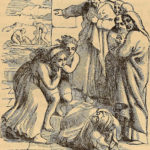We run our website the way we wished the whole internet worked: we provide high quality original content with no ads. We are funded solely by your direct support. Please consider supporting this project.

A Brief History of Political Power and the Church
The history of the church has been largely one of believers refusing to trust the way of the crucified Jesus and instead giving in to the very temptation he resisted. It’s the history of an institution that has frequently traded its holy and distinct mission for what it thought was a good mission. It is the history of an organization that has frequently forsaken the slow, discrete, nonviolent, sacrificial way of transforming the world for the immediate, obvious, practical, and less costly way of improving the world. It is a history of a people who have too often identified the kingdom of God with a “Christian” version of the kingdom of the world.
For the first 300 years, this wasn’t so. Followers of Jesus during this time saw themselves as “resident aliens.” They were a persecuted minority and as such did not dream of corporately exercising power in order to control political systems. Indeed, the church of this time grew not by Christians fighting for their rights, as so many do today, but largely by Christians being put to death. It was during this time that the word martyr, which originally meant “witness,” came to mean “one who dies for their faith,” for dying was one of the primary ways these early Christians witnessed for their faith.
It’s difficult to overemphasize the change that occurred when, in AD 312, the emperor Constantine was converted. Just prior to an important battle, legend has it that Constantine had a vision in which he was told to paint Chi Rho (the first two letters of the Greek word for “Christ”) on the shields of his soldiers. Allegedly, a voice in the vision announced, “By this sign you shall conquer.”
Constantine obeyed the vision and won the battle. The magic apparently worked, and so Constantine and his administration dedicated themselves to the Christians’ God. This was the first time anyone ever associated the Christian faith with violence, but its success stained the church from then on.
Constantine legalized Christianity in AD 313, and because of its association with him, the religion immediately exploded in popularity. Within seventy years it was proclaimed the official religion of the Roman Empire. The first recorded instance of Christians killing pagans occurred shortly after. In short order, the militant church extended its power by conquering lands and peoples throughout Europe, compelling them to become baptized Christians or die.
The cross-centered kingdom became a violent kingdom that embraced the sword. The church had become “the church militant and triumphant,” and the kingdom of God, manifested in the crucified Jesus, had become the empire of Christendom.
The sacrificial love and humility that characterized Christ and the early church had to be reinterpreted at this time to accommodate the new power that the church leaders believed God had given to the church. The lifestyle of Jesus and the early church came to be understood as a provisional inconvenience that had to be tolerated until Christianity could gain status in the world. Jesus and the early disciples had to be humbled and suffer, it was argued, because they didn’t have the power to do otherwise.
They argued that since the church knows the truth and thus knows what is best for all people it would be positively immoral to lay this power aside. Rather, the church used its newfound power to compel (by force) heathens and heretics to agree with it and be saved.
For the sake of the kingdom of God, we must rethink all of this. We must once again proclaim with our lives, and with our words when necessary, that the sole criteria for whether something is a manifestation of the kingdom of God or not is the person of Jesus Christ. Kingdom people need to lead the charge in proclaiming that the church has nothing to do with the kingdom of God whenever it wields the sword instead of loving. Only to the extent that the church looks like Jesus, dying for those who crucified him and praying for their forgiveness—to that degree can the people of God be said to manifest the kingdom of God.
—Adapted from The Myth of a Christian Nation, pages 75-82
Photo credit: johnpaulsimpson via Visual hunt / CC BY-ND
Category: General
Tags: Church, Constantine, Political Idolatry, Politics, Power
Related Reading

Who Killed Ananias and Sapphira? A Response to Paul Copan (#6)
In his critique of Crucifixion of the Warrior God (CWG), Paul Copan makes a concerted effort to argue that the God revealed in Jesus Christ and witnessed to throughout the NT is not altogether non-violent. One of the passages Copan cites against me is the famous account of Ananias and Sapphira falling down dead immediately…

One Hope
When Jesus was crucified by his enemies instead of conquering his enemies, the hope of Jesus’ disciples came crashing down in utter despair. They had hoped that Jesus would establish the kingdom of God in the same way that other kingdoms were established. However, the resurrection reveals that the kingdom of God is not like…

What Kind of God Did Jesus Reveal?
The ReKnew Manifesto exists to encourage believers and skeptics alike to re-think things they thought they already knew – hence our name, Re-Knew. I am currently working through the theology of the Manifesto in a series of posts that began a couple of months ago. Over the last few posts, we have been looking at the…

What do you think of the left wing Christians who are calling on Christians to stand up for “biblical justice”?
Yes, we’ve been hearing a lot of this recently, especially from more “progressive” (left-tending) Christians calling on people to vote “God’s politics” and stand up for “biblical justice.” On the one hand, I along with everyone else applaud such rhetoric, for what Bible-believing Christian in their right mind would take a stand against “biblical justice”?…

God and Our Political Platforms
Rachel Held Evans posted a blog today on the stir created when Democrats booed the passing of “an amendment to the party platform reinstating language that identified Jerusalem as the rightful capital of Israel and that referred to people’s “God-given potential” in its preamble.” Of course this fed into the belief that if you’re a…

